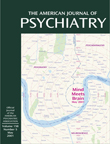Delusions and Suicidality
Abstract
OBJECTIVE: Delusions have been considered a risk factor for suicidal behavior. To determine whether specific delusion types are related to suicidal behaviors, the authors compared the clinical characteristics of patients with mood disorders and schizophrenia who did and did not have a history of suicide attempts. METHOD: After admission for inpatient or outpatient psychiatric treatment, 429 patients (ages 14–72 years; 47.1% male; and 73.0% Caucasian) were assessed with a structured clinical interview that generated axis I and II diagnoses. In addition, their psychiatric symptoms, history of suicide attempts, and overall functioning were rated. RESULTS: Data for three diagnostic subgroups (223 patients with major depression, 150 with schizophrenia, and 56 with bipolar disorder) were analyzed separately. Multivariate analyses did not find evidence of a relationship between delusions and history of suicidal ideation or suicide attempts in any of the diagnostic groups. CONCLUSIONS: This study did not find evidence that the presence of delusions distinguished persons with or without a history of suicide attempt.



